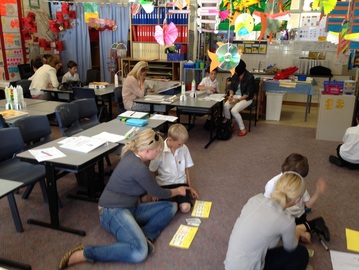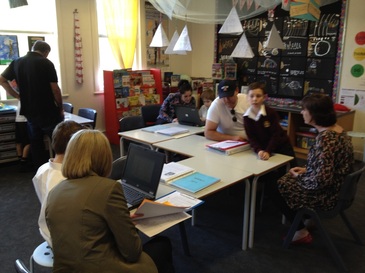Demonstrate understanding of a range of strategies for reporting to students and parents/carers and the purpose of keeping accurate and reliable records of student achievement.
Standard 5.5
Standard 5.5
Reports
When reporting on student performance I will consider the following:
- Achievement
- Aptitude
- Effort
- Compliance
- Attitude
- School policy
Teacher-parent interview
These interviews are an opportunity for involving parents in the assessment process and indicate areas for remediation and suggestions for improvement.
As a teacher I will need to:
- Identify outcomes by which students are to be assessed
- Collect evidence to determine the achievement or non-achievement of the outcomes
- Conference with the student to indicate what will be reported to parents
- Provide parents with sufficient notice
- Begin the interview positively
- Outline my routines and policies
- Discuss the students' preferred learning activities and my main concerns
- Share my thoughts about and responses to the information conveyed
- Check the parent to ensure a common understanding
- Offer the parent any support material that explains policy or pedagogy
- Request written feedback from the parent
Student-led conferences
Conferences are based on student portfolios that include samples of completed work and written self-reflections, and involve students in sharing their academic and social strengths, weaknesses and goals. Conferences usually follow a process, for example:
Stage 1 - student work is stored in folders that contain student lists of strengths and weaknesses, goals for next term, and a description of citizenship behaviour. Each subject piece is prefaced by a self-reflection.
Stage 2 - The student portfolios are prepared and a letter is sent to parents informing them of the purpose and format of the reporting session.
Stage 3 - Students collect their folders and organise their portfolios. They comprise four samples of work for each subject and a reflection page on each.
Stage 4 - Students are trained on how to conduct a conference. The training involves input from teachers on greeting parents and presenting and explaining portfolios, and opportunities to practice the presentation with peers.
Stage 5 - Students conduct the conference. Five 15-minute conferences occur simultaneously in each room.
Stage 6 - Teachers thank parents and invite them to write a letter to their child sharing personal opinions and feelings. These letters are then reviewed.
Teacher-student-parent interview
Students demonstrate what they know by showing evidence of their achievements. Parents learn about their child's progress, have the opportunity to ask questions, and can negotiate strategies for supporting the child. The teacher faciliates the process, responding to questions as necessary, and learning valuable information about the student's home environment. For teachers, it promotes shared responsibility for student learning and strengthens communication with parents; for students, it enhances self-esteem and empowers them as they assume ownership of their learning; and for parents, it increases their understanding of learning, and allows them to participate in more actively in the reporting process.
Other strategies for reporting student achievements include:
- Portfolios
- School newslettters
- Open days
- Speech nights
- Classroom visits
- Curriculum and program documents
- Homework
- Formal school meetings
- Assemblies
Source: Brady, L., Kennedy, K. (2009). Celebrating student achievement: assessment and reporting. 3rd ed, Frenchs Forest, N.S.W.: Pearson Education Australia.


